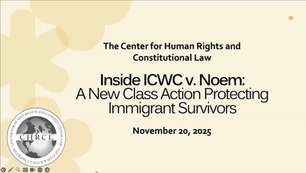

U.S. Senators, State Attorneys General’s Offices, healthcare professionals, child advocates, law professors and more file amicus briefs in support of the Flores Settlement
As the federal government incarcerates increasing numbers of children and families, 26 U.S. Senators, 20 State Attorneys General’s Offices, and more than 180 prominent child and immigrant advocacy organizations, law professors, and former immigration judges have filed amicus briefs in the Ninth Circuit in support of the Flores Settlement.




